Since I've now got to give a talk on the subject...
Overcome by remorse after my insane rant the other day, I thought it would be more civilized to write a polite explanation to my host at the Brisbane Writers Festival, who I suppose cannot otherwise complain about all the publicity I'm giving it here. Thus I've cut and pasted, from a longer email, the explainy bit, which may interest those of my readers who are not yet sick to their stomachs with the whole disquisition. (If you make the effort, I promise a good punchline, and if you're new here, hey kids, you can cut and paste this into your homework and call it your own. If you steal my explanation rather than somebody else's i won't need to browbeat you later.)
Firstly, the works of Tezuka are great works indeed, no slight intended there. But the issue at hand is one of eras rather than achievements or intentions. It's like when my grandmother used to refer to all pop music as 'jazz,' bless her.
In its most ideal conception, the 'graphic novel' idea originates in the early '70s. It tends to reject the superheroic characters of the comic books, and instead hearkens back for its inspiration to the characters of an earlier period, of the first twenty or thirty years of the century. It begins when various publishers started to collect in handsome hardcover editions those old comic strips, lying forgotten except by the antiquarians of popular culture (e.g. the huge and gorgeous Nostalgia Press collected Little Nemo from 1970), and critical writers started appearing to discuss them in the terms of serious art and literary criticism. The trend caught the fancy of a generation of enthusiasts who had been taking the monthly comic books very seriously through the sixties, when it became not uncommon to find college students reading the things (well, supposedly). It was a simple step from there to the conception that, since wit, truth and charming artistry could be found in the best of the old things (in the poetic improvisations of Herriman's Krazy Kat for instance), that it would be possible to conceive new and ambitious works using the simple formal elements of the daily comic strip, that the great novel of our times could be composed just using these. Note that the concept of the graphic novel, and the name too, existed before any examples. The theory preceded the fact, in other words. Spiegelman's winning of the Pulitzer was the event which confirmed once and for all the concrete validity of the abstract theory.
(It is argued, with justification, that this is not entirely true, and that the quest to match the abstract to concrete has turned up many examples from the history of illustrated books, such as the woodcut novels of the 1930s. For historical clarity it's best to classify these as 'antecedents' of the 'graphic novel')
However, in its more corrupted version, among people who are so wrapped up in the comic book thing that they can't really recognise a fine idea from a second rate one (and I'm not saying there are no good ideas in comicbooks, but talking about a general perception among their readers and producers), the only difference they can see is one of format, thus to them 'graphic novel' is just a highflown name for the old news-stand thing presented in a bound format. I think this is the version that will win out in the end because in our modern world, the greatest power of all is the steamrolling power of stupidity (and as you've observed, it is the source of my accumulated disillusionment). There is an exreme version of this mindset that cannot even grasp the concept of formats, and to them there isn't even that distinction, it's just a synonym for comicbooks.
Anyway, it has been my hope that a literary festival might be receptive to the subtleties of the idea in its finer conception, and I press ahead intent that I may yet win the day. The works of my fellow guest, Guy Delisle, would be a very good example of what I mean. They deliver information and observation to the modern reader in a way that satisfies the most rigorous standards of art/writing/journalism.
But wait! There is yet another voice of disagreement. This is the crowd that have mostly come in late and are trying to impose a logic where they don't see it growing of its own nature. Thus they look at something like Delisle's book and say 'You called this a 'novel' but it is hardly that. Let's call it a 'graphic memoir' since that would be more logical.' These are the annoying people who arrive late at a bibulous soiree and start putting the furniture back in order while you're still sitting in it.
*************
Entirely relevant to the above, that cheeky Nicki Greenberg has put me in her comic Smackdown!! Campbell vs Greenberg Title Fight
***********
not related at all, a quote:
"There is a point at which the sane man believes a doctrine and says 'yes'- beyond which he disbelieves it and says 'no'. That is why the mentally sane have such an uncomfortable time in a world compose largely of doctrinal lunatics."
Leonard Woolf, quoted in Victoria Glendinning's biography.
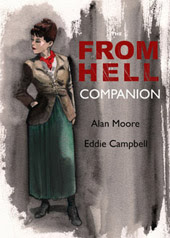
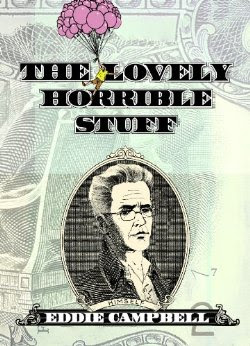

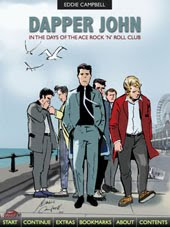
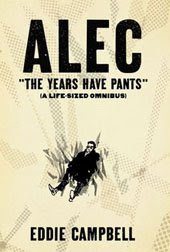
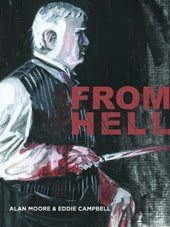
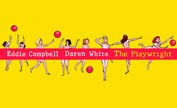
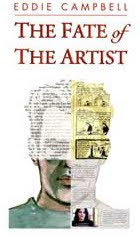
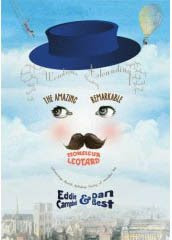

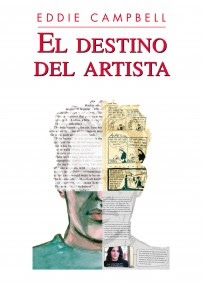
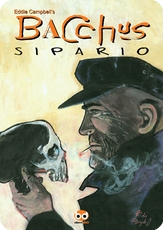
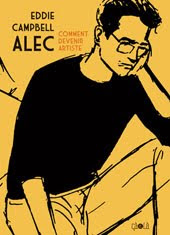

13 Comments:
Thought this might interest:
Jack Kirby, a Comic Book Genius, Is Finally Remembered
http://www.nytimes.com/2007/08/26/opinion/26sun3.html
I like this Nicki Greenberg.
Now if we start calling you René, you'll know why...
Good luck with the panel thing. I know I'm a bit late with this one, but when I read the word manifesto down below, it reminded me of the glorious "Where's Me Jumper" by the Sultans of Ping FC. Somehow I'm not sure it (your use of the word, not the song, I'm sure that was) was meant to invoke such delirium, but it seems apt. Someone might be able to find a listenable link, but such things are beyond me.
Hey Eddie, just an aside to the Rockford Files... did you ever see Bakersfield PD? It was SO funny but unfortunately cancelled and a attained cult status of sorts.
It was about a big city cop moving to a small-town police station (to get away from it all). It's been done before and since, but the humour was ever so subtle and one of the funniest thing was how the police in Bakersfield loved The Rockford Files.
I remember one episode where James Garner was going to visit the town (and I seem to remember he actually made it, too), much to the excitement of the whole precinct.
Genuinely a wonderful show... which um, has very little to do with Jim Rockford, really. But er, if you get the chance to see an episode, you might light it!
Eddie -
Without meaning to move any furniture around, I find your definition unhelpful. You suggest that a "graphic novel" is necessarily more serious and ambitious than a run-of-the-mill comic book. That is, seriousness of purpose is a condition that separates a proper Graphic Novel from the larger set of "Long Stories in Sequential Art Format."
But I don't think you can do that. You can't beg the question of quality when defining the medium. Just because a words-only novel is bad doesn't make it a short story or a play. It's still a novel, even without being literary, ambitious or well-realized.
I agree that historically, the term Graphic Novel was created to separate the serious work from the commercial genre work - something that needed to be done at the time. By coining the term graphic novel, Eisner chose to draw the line of demarcation in terms of format: book vs. pamphlet. We can debate after the fact whether that was a good place to draw the line or not, but what's done is done. You can't now stand at the gates and say, "well, he only meant the good ones."
Crisis on Infinite Earths, at least in its collected form, meets the basic criteria in that it is a long story (novel) told using words and pictures (graphic). It’s even fairly ambitious by its own lights, and the art is realized with prodigious technical skill. The fact that it's commercial continuity porn, rehashing the most familiar genre characters and conventions, does not and should not, on its own, exclude it from being called what it is: a graphic novel. Sure, it’s not a good graphic novel - at least not in my opinion - but 90% of everything is crap anyway, yes? Mature criticism recognizes that the existence of bad work in a medium does not make the whole medium bad or unserious, and, on the flipside, that lack of pretention does not equal lack of quality. That’s why you have criticism: to point out the differences. I don’t think it’s productive to have a generic definition – Graphic Novel – that can only be applied after the fact to work judged to meet some subjective standard of quality. That’s what the word “good” is for.
Rob,
You appear to be forgetting the context. I've been put in a position of having to explain a concept in which I no longer believe.
You are looking at the comedy of an artist who is trying to get out of all this shit and keeps getting dragged back in.
None of this is of any interest to me whatsoever.
I'm not sure why Nicki was lampooning me arguing about the use of terms. What I was saying to her is, that when we're on this panel tomorrow in Melbourne, for god's sake don't gve anybody in the audience a chance to start a semantic argument by suggesting that you care what the medium is called or what it includes.
Eddie
Regardless, 'From Hell', Watchman' and Maus' are currently 'front of house' at the Borders at Chermside (Brisbane), not shoved to one side between Si-Fi and Crime. At least people are reading the bloody things.
Right, sorry.
Rather than the fellow who rearranges the furniture at the end of the party, I'm the guy who corners the drunken guest as he's making his desparate way to the toilet to be sick. Beg pardon.
Have fun on your panel!
I think you did a drawing/cartoon/poster for the hard of hearing/deaf about 30 years ago. I've been looking for that poster forever.
Any chance you'd put it in your blog?
Joyce
pardon?
Ahahahaha!
You made a funny.
Eisner aside, by coincidence I was looking today at my battered copy of Chandler by Jim Steranko, an "illustrated novel" published by Byron Preiss in 1976. There on the back page is the slogan "Fiction Illustrated: America's First Graphic Novel Revue". Chandler was a Forties' detective tale mixing words and pictures on every page; not quite a comic and very much a genre piece. (And pretty much the template for Frank Miller's Sin City style, incidentally...)
Post a Comment
Subscribe to Post Comments [Atom]
<< Home